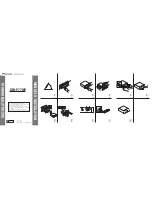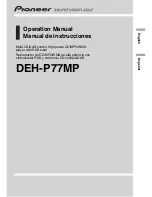
Operating Instructions
Manuel d’utilisation
Portable DVD Car Kit
Nécessaire de voiture pour Lecteur DVD Portatif
Model No./Modèle
DY-CB9
Panasonic Consumer Electronics Company,
Division of Panasonic Corporation of North America
One Panasonic Way Secaucus,
New Jersey 07094
http://www.panasonic.com
Panasonic Canada Inc.
5770 Ambler Drive, Mississauga, Ontario L4W 2T3
www.panasonic.ca
Panasonic
Puerto Rico, Inc.
Ave. 65 de Infantería, Km. 9.5
San Gabriel Industrial Park,
Carolina,
Puerto Rico 00985
C
2005 Matsushita Electric Industrial Co., Ltd.
Printed in China/Imprimé en Chine
RQT8684-Y
F0206MG0
This manual was printed with soy based ink.
Ce manuel a été imprimé avec de l’encre à base de soja.
PP
If you have any questions contact
Pour toute demande de renseignements, appeler au
U.S.A.: 1-800-211-PANA(7262)
Canada: 1-800-561-5505
Applicable model
Pour les modèles
DVD-LS91/DVD-LX97/DVD-LX110
[Portable\DVD\Player\not\included]
[Lecteur\DVD\Portatif\non\inclus]
p q
Specifications
(Headphone)
Driver units:
30 mm (1
3
/
16
q
)
Impedance:
24
≠
Sensitivity:
100 dB/mW
Power handling capacity:
1000 mW (IEC)
Frequency response:
16 Hz - 22 kHz
Cord:
1.3 m (4.5 ft.)
Plug:
3.5 mm (1/8
q
)
Specifications are subject to change
without notice.
Product Service
1.Damage requiring service
—The unit
should be serviced by qualified service
personnel if:
(a)The AC power supply cord or AC
adaptor has been damaged; or
(b)Objects or liquids have gotten into the unit; or
(c)The unit has been exposed to rain; or
(d)The unit does not operate normally or
exhibits a marked change in performance; or
(e)The unit has been dropped or the
cabinet damaged.
2.Servicing
—Do not attempt to service the
unit beyond that described in these
operating instructions. Refer all other
servicing to authorized servicing personnel.
3.Replacement parts
—When parts need
replacing ensure the servicer uses
parts specified by the manufacturer or
parts that have the same characteristics
as the original parts. Unauthorized
substitutes may result in fire, electric
shock, or other hazards.
4.Safety check
—After repairs or service,
ask the servicer to perform safety
checks to confirm that the unit is in
proper working condition.
For product information or assistance with
product operation:
In the U.S.A., refer to “Customer Services
Directory” on the right.
In Canada, contact the Panasonic
Canada Inc. Customer Care Centre
at 1-800-561-5505, or visit the website
(www.panasonic.ca), or an authorized
Servicentre closest to you.
Specifications
(Headphone)
Driver units:
30 mm (1
3
/
16
q
)
Impedance:
24
≠
Sensitivity:
100 dB/mW
Power handling capacity:
1000 mW (IEC)
Frequency response:
16 Hz - 22 kHz
Cord:
1.3 m (4.5 ft.)
Plug:
3.5 mm (1/8
q
)
Specifications are subject to change
without notice.
Service après-vente
1.En cas de dommage
—Confier l’appareil à
un technicien qualifié dans les cas suivants:
(a)lorsque le cordon d’alimentation ou
l’adaptateur secteur a été endommagé;
(b)lorsqu’un objet est tombé dans
l’appareil ou si ce dernier a été mouillé;
(c)lorsque l’appareil a été exposé à la pluie;
(d)lorsque l’appareil semble ne pas
fonctionner normalement ou que son
rendement laisse à désirer;
(e)lorsque l’appareil a subi un choc violent
ou que son coffret a été endommagé.
2.Réparation
—Ne faire aucun réglage ni
ajustement autres que ceux décrits dans le
présent manuel. Confier toute réparation à
un centre de service Panasonic agréé.
3.Pièces de rechange
—S’assurer que le
technicien utilise des pièces de
rechange recommandées par le
fabricant ou dont les caractéristiques
sont les mêmes. L’utilisation de pièces
de rechange non autorisées peut
causer un incendie, des chocs
électriques ou d’autres dangers.
4.Vérification de sécurité
—Demander au
technicien qui a réparé l’appareil de soumettre
ce dernier à des vérifications pour s’assurer
qu’il peut être utilisé en toute sécurité.
Pour toutes réparations, renseignements ou
conseils sur le fonctionnement du produit:
Veuillez contacter le service à la clientèle
de Panasonic Canada Inc.
au 1-800-561-5505,
son site web (www.panasonic.ca) ou le
centre de service agréé le plus proche.
Product information
Demande d’informations
Dear customer
Thank you for purchasing this product.
For optimum performance and safety, please read these instructions carefully.
Before connecting, operating or adjusting this product, please read the instructions
completely. Please keep this manual for future reference.
-If you see this symbol-
Cher client
Nous vous remercions d’avoir arrêté votre choix sur cet appareil. Pour en tirer un
rendement optimal, lire attentivement le présent manuel.
Avant de raccorder, régler ou utiliser l’appareil, il est recommandé de lire attentivement le manuel
d’utilisation.Conserver ce manuel.
- Si ce symbole apparaît -
≥
Do not attach or detach the Headrest Mounting Bracket while driving, and do not
attach in the following locations, otherwise it may result in injury or traffic
accidents:
–anywhere other than the back of the seat
–in a location that interferes with the driver’s view or operation of the car
–in a location that interferes with the operation of an airbag
–in a location that interferes with the driving instruments
≥
Make sure that the bracket belt is securely fastened, and check the lock on the unit.
In the event of an accident, sudden acceleration, or braking, the unit could become loose and
cause injury.
Do not play your headphones or earphones at a high volume. Hearing experts advise
against continuous extended play.
If you experience a ringing in your ears, reduce volume or discontinue use.
Do not use while operating a motorized vehicle. It may create a traffic hazard and is
illegal in many areas.
You should use extreme caution or temporarily discontinue use in potentially
hazardous situations.
Even if your headphones or earphones are the open-air type designed to let you hear
outside sounds, don’t turn up the volume so high that you can’t hear what’s around you.
Sound can be deceiving. Over time your hearing “comfort level” adapts to higher volumes of
sound. So what sounds “normal” can actually be loud and harmful to your hearing.
Guard against this by setting your equipment at a safe level BEFORE your hearing adapts.
To establish a safe level:
≥
Start your volume control at a low setting.
≥
Slowly increase the sound until you can hear it comfortably and clearly, and without
distortion.
Once you have established a comfortable sound level:
≥
Leave it there.
Information on Disposal in other Countries outside the
European Union
This symbol is only valid in the European Union.
If you wish to discard this product, please contact your local authorities
or dealer and ask for the correct method of disposal.
E
L
E
C
T
R
O
N I
C
I N D
U
S
T
R
IE
S
•
A
S
S O
C I A T
I O
N
•
EST. 1924
Listening caution
≥
Do not attach or detach the Headrest Mounting Bracket while driving, and do not
attach in the following locations, otherwise it may result in injury or traffic
accidents:
–anywhere other than the back of the seat
–in a location that interferes with the driver’s view or operation of the car
–in a location that interferes with the operation of an airbag
–in a location that interferes with the driving instruments
≥
Make sure that the bracket belt is securely fastened, and check the lock on the unit.
In the event of an accident, sudden acceleration, or braking, the unit could become loose and
cause injury.
Éviter l’écoute à volume élevé. Les spécialistes en otologie recommandent de ne
pas prolonger l’écoute afin de ne pas endommager l’ouïe.
Si un bourdonnement se fait entendre, réduire le volume ou cesser l’écoute.
Ne pas utiliser au volant d’un véhicule motorisé. Cela peut être dangereux et est interdit
dans plusieurs régions.
Démontrer une grande prudence ou interrompre l’écoute dans des situations
potentiellement dangereuses.
Même si le casque d’écoute ou les écouteurs sont du type ouvert devant permettre
d’entendre les bruits ambiants, ne pas trop élever le volume.
Le son peut être trompeur. Avec le temps, votre niveau de confort auditif s’adapte à des
volumes plus élevés. Ainsi, un niveau qui semble normal peut en fait être trop élevé et
être nuisible à l’oreille.
Protégez-vous en réglant le volume à un niveau sécuritaire avant que votre oreille ne
s’adapte à un volume trop élevé.
Pour déterminer un niveau d’écoute sécuritaire:
≥
Régler le volume au minimum.
≥
Monter lentement le volume jusqu’au niveau d’écoute confortable avant qu’il n’y ait
distorsion.
Après avoir identifié le niveau d’écoute confortable:
≥
Laisser l’appareil réglé à ce niveau.
Information sur la mise au rebut dans les pays n'appartenant
pas à l'Union européenne
Ce symbole est uniquement valide dans l'Union européenne.
Si vous désirez mettre ce produit au rebut, contactez
l'administration locale ou le revendeur et informez-vous de la
bonne façon de procéder.
E
L
E
C
T
R
O
N I
C
I N D
U
S
T
R
IE
S
•
A
S
S O
C I A T
I O
N
•
EST. 1924
Protection de l’ouïe






















